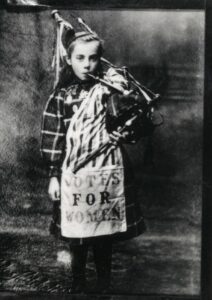Elizabeth Watson (13 July 1900 – 27 June 1992) was a Scottish child suffragette and piper. Born in Edinburgh, Watson began playing the pipes at a young age to strengthen her lungs against tuberculosis. Encouraged by her parents, she joined the Women’s Social and Political Union (WSPU) and played the pipes in a pageant celebrating Scottish women’s history organized by Flora Drummond and the WSPU.
At the age of 9, Watson participated in the procession that marched down Princes Street in Edinburgh. She rode on a float beside a woman dressed as Isabella McDuff, Countess of Buchan, and caught the attention of Christabel Pankhurst, who presented her with a brooch depicting Boudica. Watson later gave this brooch to Margaret Thatcher, the first female Prime Minister of the UK.
Watson’s involvement with the suffragette movement continued as she played the pipes to support imprisoned suffragettes and wore suffragette campaign ribbons to school. She became a member of the Highland Pipers’ Society at 14 and won numerous piping awards. Watson also established the Broughton School Pipe Band, which she led for 27 years.
In addition to her piping career, Watson studied French at the University of Edinburgh and taught violin and modern languages in schools across the city. She married John Somerville in 1945 and continued playing the pipes daily well into her 80s. Watson passed away in Edinburgh in 1992, leaving her autobiography and piping equipment to the College of Piping in Glasgow.
Elizabeth Watson’s remarkable life as a suffragette and piper left a lasting legacy. In 2019, a memorial plaque was unveiled at her former home, now St Andrew’s House, by Scotland’s First Minister Nicola Sturgeon, who reflected on Watson’s achievements as the first woman to hold the position of First Minister of Scotland.
More information:
Wiki



Leave a Reply